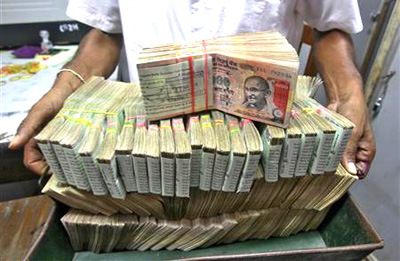
Syria crisis adds impetus to investor flight
London, August 27, 2013
The Indian rupee and Turkish lira tumbled to new record lows on Tuesday as investors' headlong flight out of emerging markets gathered pace with added impetus from uncertainty over Western military action against Syria.
A number of other emerging currencies hit multi-year lows even though US Treasury 10-year yields, which such currencies tend to track, were off two-year highs. The currency losses also led to an exit from emerging equities, which fell 1.8 per cent .
Currencies of countries with current account deficits have sold off heavily ever since the US Federal Reserve hinted at the end of May it would consider cutting back on its monetary stimulus. The selloff has since spread to more robust emerging economies.
"Today we have more of the same but with the added twist of geopolitical concerns so you have all the ingredients of a heavy risk aversion shock," said Benoit Anne, head of emerging markets strategy at Societe Generale in London.
"Add to that the uninspiring performance by EM central banks such as Turkey so we have a credibility shock as well."
The rupee fell almost three per cent for its biggest monthly fall in 18 years after news of a $20 billion cheap food scheme raised fears of a renewed fiscal deficit blowout for what is seen as one of the most vulnerable emerging economies.
The rupee losses fed into share markets which fell 3 per cent while government 10-year bonds fell 2.5 points.
Elsewhere Indonesia's central bank called a surprise meeting for Thursday, triggering speculation of new rate increases to defend the rupiah, plumbing new four-year lows every day.
The Turkish lira plunged 1.5 per cent , feeling the heat from the situation in neighbouring Syria as well as the central bank's reluctance to raise interest rates to levels that provides investors with adequate rewards for the risks.
Losses spiralled after Governor Erdem Basci said he was prepared to use the central bank's net reserves of $40 billion to defend the currency but said he would not use interest rates.
Two-year bond yields touched January 2012 highs around 10.4 per cent and shares fell 2.5 per cent . Five-year credit default swaps used to insure exposure to Turkish debt, jumped 11 basis points to 14-month highs of 242 basis point, according to Markit.
"There is only one way to stop this. You have to aggressively tell the market you will make it too expensive to short the lira," said Luis Costa, head of CEEMEA FX and debt strategy.
"If you are a central bank governor, are you going to lean against the wind and throw away your currency reserves or are you going to listen to what the market is telling you?"
Syria is further complicating matters for emerging markets.
Political risk was prompting a broader-based flight to safer assets such as yen and Swiss franc.
Western powers could launch attacks on Syria "within days" after accusing Bashar al-Assad's government of chemical warfare, sources told Reuters.
Turkey would be in the frontline if military attacks are launched on Syria. Higher oil bills and a refugee influx from the neighbouring conflict could exacerbate its $50 billion-a-year funding gap.
Israel's shekel, also sensitive to events in the region, fell more than one per cent to the dollar.
The Russian rouble hit a four-year low while the Hungarian forint lost one per cent following a 20 basis point cut in interest rates.
The South African rand lost one per cent while the selling pressure spread to Latin American currencies as well, pushing the Brazilian real down one per cent to stand just off the five-year lows hit before the announcement of a $60 billion currency defence plan.
The Mexican peso, considered relatively robust because the economy's strong fundamentals, also fell 1.5 per cent .-Reuters







